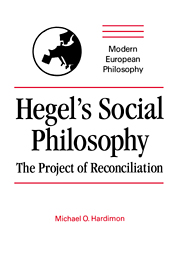2 - Geist and the Doppelsatz
Published online by Cambridge University Press: 10 December 2009
Summary
If we are to understand Hegel's project of reconciliation, we must have some acquaintance with the philosophical point of view it presupposes. I have decided to try to convey a sense of this point of view by sketching two ideas central to the view: the concept of Geist (spirit, mind) and the Doppelsatz (the double dictum).
Geist is the term Hegel employs to refer to human individuals, human culture and society, and God. It constitutes the foundation of Hegel's philosophical anthropology (his philosophical conception of the nature of the human being), which, as we will see, is closely connected with his philosophical sociology and his theory of history and theology. The Doppelsatz encapsulates Hegel's basic conception of reason, reality, and the relation between them. It also encapsulates the basic methodological approach and normative outlook of his social philosophy.
I should point out that my purpose in presenting these ideas is not to defend them but rather to make them accessible to readers unacquainted with Hegel's philosophy. And I should stress that my general aim in this reconstruction is to minimize reliance on Hegel's metaphysics. My purpose in this chapter is to provide part of the orientation necessary to approach Hegel's social philosophy.
This chapter has two parts. In the first, I discuss Hegel's concept of Geist; in the second, I discuss the Doppelsatz.
Geist
Geist is the basic concept of Hegel's philosophy. Geist can be translated as ‘mind’ or ‘spirit’.
- Type
- Chapter
- Information
- Hegel's Social PhilosophyThe Project of Reconciliation, pp. 42 - 83Publisher: Cambridge University PressPrint publication year: 1994
- 1
- Cited by

